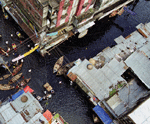Bangladesh: An urgent call for financial and climate justice
Published on Thu, 2012-11-29 09:29
The international community must rule out the “one size fits all” approach and design an “effective sets of goals” needed to ensure a sustainable development, letting the solutions to be defined by each country, recommends the Social Watch coalition in Bangladesh, a nation severely affected by climate change. The new framework must ensure “equity”, “justice”, “the preservation of Mother Earth and the life and livelihood of all human beings,” adds the Bangladeshi contribution to the Social Watch Report 2013. “A strong reform of the international financial institutions’ (IFIs) structure” is also required, so the decisions of these bodies should be made in a participatory manner. “There should be a ‘one member, one vote’ policy,” suggest the report, written by Zahid Rahman and Choyn Kumar Shaha (Unnayan Sammanay), and Mujibul Haque Munir (EquityBD). The Bangladeshi Social Watch coalition demands the IFIs “a full debt cancellation” to allow the country to use “its own finances to achieve the MDG targets by stipulated time.” “According to World Bank and IMF calculations, the debt-export ratio for Bangladesh stands at 146 percent,” explains the report. “The pace of MDGs attainment is largely dependant on its financing, which can be possible shifting the so called debt servicing finances to the MDG activities.” The study by Zahid Rahman, Choyn Kumar Shaha and Mujibul Haque Munir warns that “Bangladesh deserves climate justice,” because “developed countries have created climate change” through “their accumulated high level of carbon emissions”. The South Asian nation “is not responsible” for the phenomenon, “even when it is severely impacted by global warming” and “experiencing the greatest impact”. The report demands to determine the “historical responsibilities of high carbon emitting countries,” and to establish “legally binding obligations to ensure compensation for Bangladesh”. The money to finance climate change adaptation and mitigation, including technology and capacity building, “should come from the countries which are historically responsible for the phenomenon.” “Bangladesh is one of the most natural disaster prone countries in the world, occupying the 5th position among 173 countries,” add the authors. “Risk of natural hazards along with others (e.g. social, economic and technological) is gradually amplifying, and worsening the human conditions of more and more people in all parts of the country, frequently affected by tropical cyclones, flood, drought and earthquakes. Climate change impacts affect achieving the MDGs of Bangladesh, particularly Goal One – eradicating poverty and hunger,” the report says. “Climate change is likely to directly impact the poor people’s livelihoods in many ways, their assets and resources, their employment, income, access to water and natural resources. The poor persons in Bangladesh will face more food insecurity, water stress and health problems because of the rapidly changing climate that also undermines significantly the efforts to reduce poverty,” according to the study. Nevertheless, “the country has achieved remarkable progresses in some areas of the MDGs, particularly in primary schooling, gender parity in primary and secondary level education, decreasing extreme poverty, lowering the infant, child and maternal mortality, improving immunization coverage, and reducing the incidence of communicable diseases, according to various governmental and non-governmental reports,” notes the Bangladeshi Social Watch coalition. Source |
SUSCRIBE TO OUR NEWSLETTER



